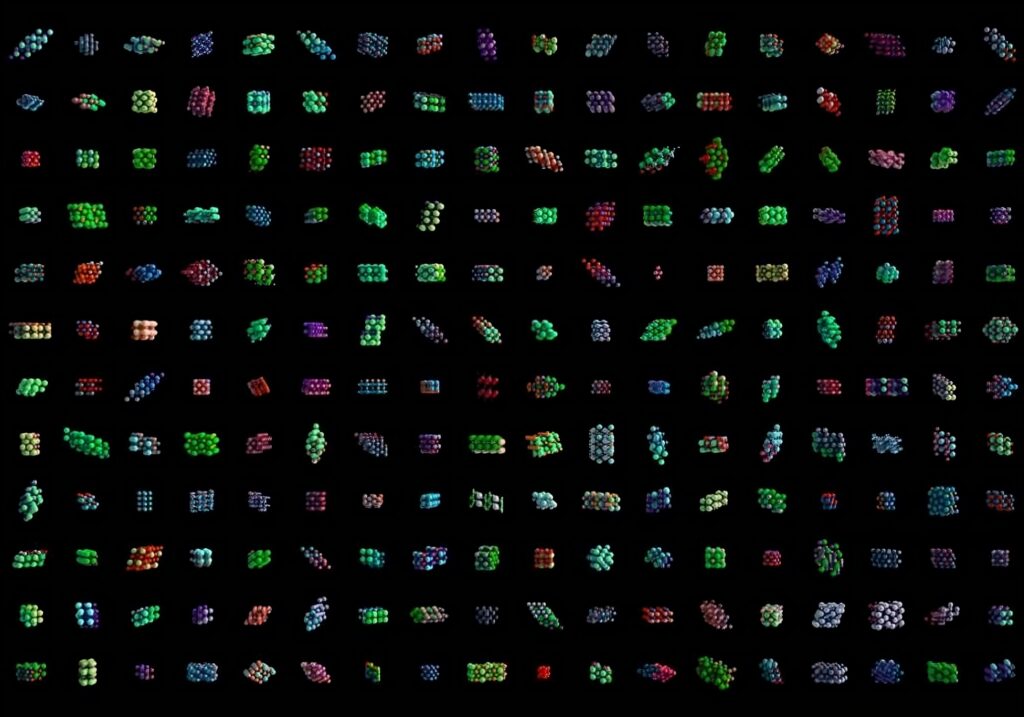Discovering new materials is key to solving some of humanity’s biggest challenges. But as Microsoft highlights, traditional methods of discovering new materials can feel like “finding a needle in a haystack.”
Historically, finding new materials required tedious and expensive trial-and-error experimentation. More recently, computers have helped speed up the process by screening vast material databases, but it remains a time-consuming process.
Now, a powerful new generative AI tool from Microsoft could significantly accelerate this process. The tool, called MatterGen, takes a step away from traditional screening methods and instead designs new materials directly based on design requirements, offering a potentially innovative approach to materials discovery.
Published in a paper in Nature, Microsoft describes MatterGen as a diffusion model that operates within the 3D geometry of a material. Where an image diffusion model generates an image from a text prompt by tweaking the color of pixels, MatterGen generates a material structure by changing the elements, positions, and periodic lattices of the randomized structure. This bespoke architecture is specifically designed to address the unique demands of materials science, such as periodicity and 3D alignment.
“MatterGen enables a new paradigm in generative AI-assisted materials design that enables efficient exploration of materials beyond a limited set of known materials,” Microsoft explains.
Leap beyond screening
Traditional computational methods screen vast databases of potential materials to identify candidates with desirable properties. But even these methods are limited in their ability to explore the world of unknown materials, forcing researchers to sift through millions of options before finding a promising candidate.
In contrast, MatterGen starts from scratch and generates materials based on specific prompts regarding chemistry, mechanical properties, electronic properties, magnetic behavior, or a combination of these constraints. The model was trained using over 608,000 stable materials compiled from the Materials Project and the Alexandria database.
In the comparison below, MatterGen significantly outperforms traditional screening methods in producing novel materials with certain properties, particularly bulk modulus greater than 400 GPa, which is difficult to compress.
While screening yielded diminishing returns over time as known candidates were depleted, MatterGen continued to produce increasingly novel results.
One of the common challenges encountered during materials synthesis is compositional perturbation, the random shuffling of atoms within the crystal lattice. Traditional algorithms are often unable to distinguish between similar structures when determining what is “truly novel” material.
To address this, we have devised a new structure matching algorithm that incorporates compositional perturbations into the evaluation. This tool identifies whether two structures are simply ordered approximations of the same underlying irregular structure, allowing for a more robust definition of novelty.
Proving that MatterGen works for materials discovery
To prove MatterGen’s potential, Microsoft collaborated with researchers at the Shenzhen Institute of Advanced Technology (SIAT), part of the Chinese Academy of Sciences, to experimentally synthesize new AI-designed materials.
The TaCr2O6 material was produced by MatterGen to meet a bulk modulus target of 200 GPa. The experimental results were slightly below target, with an elastic modulus of 169 GPa, but the relative error was only 20%, a small difference from an experimental perspective.
Interestingly, although the final material exhibited compositional disorder between Ta and Cr atoms, its structure closely matched the model predictions. If this level of predictive accuracy can be applied to other areas, MatterGen could have a major impact on materials design for batteries, fuel cells, magnets, and more.
Microsoft is positioning MatterGen as a complementary tool to its previous AI model, MatterSim, that accelerates the simulation of material properties. Together, these tools can act as a technological “flywheel” to power both the exploration of new materials and the simulation of their properties in iterative loops.
This approach aligns with what Microsoft calls the “Fifth Paradigm of Scientific Discovery,” where AI goes beyond pattern recognition to actively guide experiments and simulations.
Microsoft has released the source code for MatterGen under the MIT License. In addition to the code, the team has made available model training and fine-tuning datasets to support further research and encourage widespread adoption of this technology.
Microsoft points to similarities with drug discovery, reflecting the broader scientific potential of generative AI. In drug discovery, such tools have already begun to transform the way researchers design and develop drugs. Similarly, MatterGen has the potential to reshape the way we approach materials design, especially in critical areas such as renewable energy, electronics, and aerospace engineering.
(Image credit: Microsoft)
See also: L’Oréal: Making cosmetics sustainable with generative AI

Want to learn more about AI and big data from industry leaders? Check out the AI & Big Data Expos in Amsterdam, California, and London. This comprehensive event will be co-located with major events such as Intelligent Automation Conference, BlockX, Digital Transformation Week, and Cyber Security & Cloud Expo.
Learn about other upcoming enterprise technology events and webinars from TechForge here.



